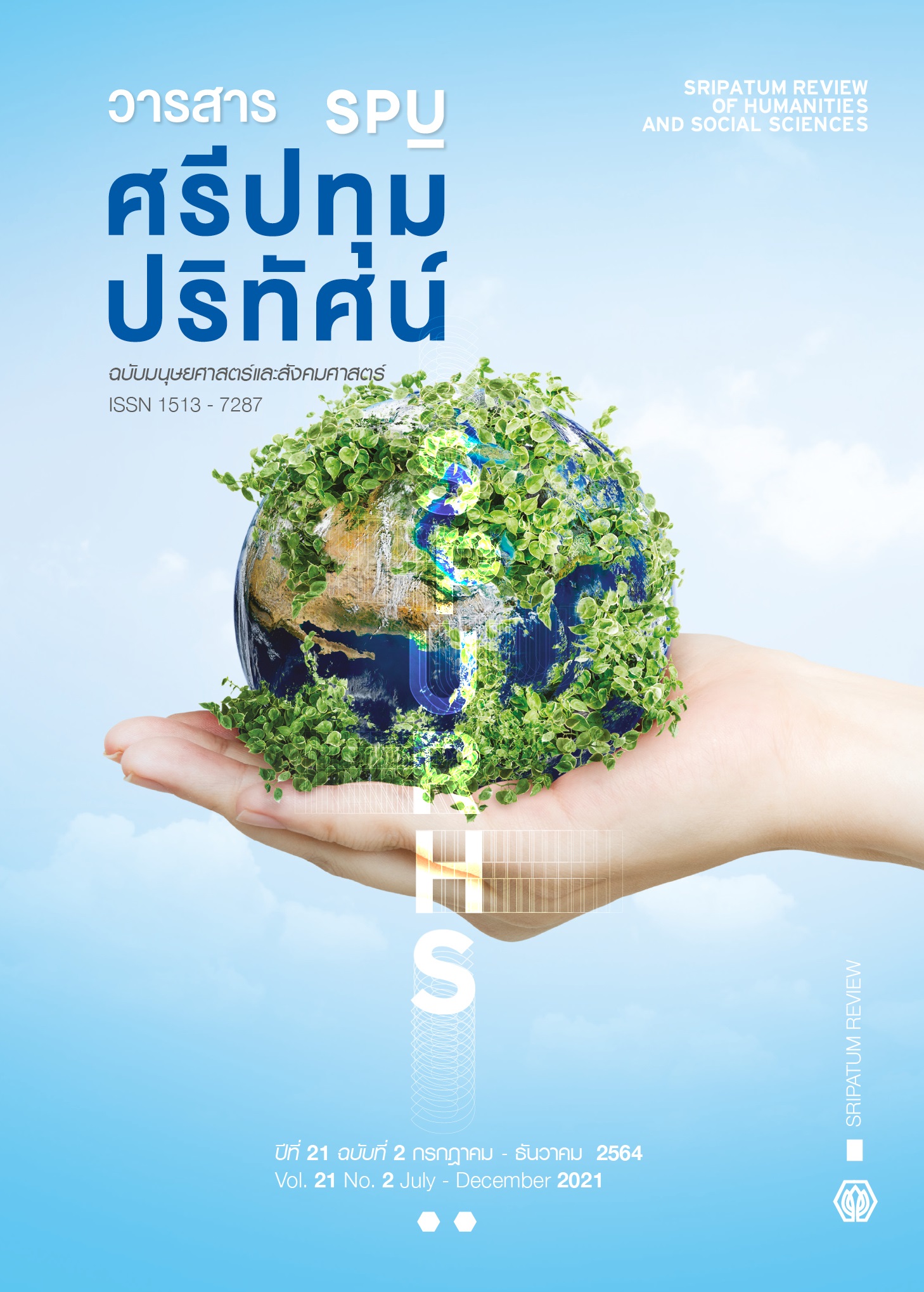การศึกษาข้อมูลทุติยภูมิด้านความสุขของประชากรสูงอายุในประเทศไทย ปี พ.ศ. 2560 (A Study of 2017 Secondary Data of the Happiness Among Thai Elderly)
Main Article Content
บทคัดย่อ
การวิจัยครั้งนี้มีวัตถุประสงค์เพื่อศึกษาความสุขของประชากรสูงอายุและศึกษาปัจจัยที่เกี่ยวข้องกับความสุขของประชากรสูงอายุในประเทศไทย โดยเป็นงานวิจัยเชิงปริมาณ อาศัยข้อมูลทุติยภูมิจากโครงการ “การสำรวจประชากรสูงอายุในประเทศไทย พ.ศ. 2560” ของสำนักงานสถิติแห่งชาติ มุ่งศึกษาวิจัยเฉพาะประชากรผู้สูงอายุไทยที่มีอายุ 60 ปีขึ้นไป ตอบคำถามถึงระดับความสุขในช่วง 3 เดือนที่ผ่านมาด้วยตนเอง มีจำนวนรวมทั้งสิ้น 34,284 ราย ผลการวิจัย พบว่า ผู้สูงอายุไทยมีคะแนนความสุขเฉลี่ย 6.98 คะแนน (จากคะแนนเต็ม 10.00 คะแนน) โดยมีส่วนเบี่ยงเบนมาตรฐาน เท่ากับ 1.38 เมื่อนำคะแนนความสุขมาจัดเป็นกลุ่มความสุข 3 กลุ่ม ปรากฏว่า ประชากรสูงอายุกลุ่มใหญ่ที่สุด (ร้อยละ 49.36) มีความสุขปานกลาง รองลงมาคือ มีความสุขมาก (ร้อยละ 36.17) ขณะที่ร้อยละ 14.47 มีความสุขน้อย สำหรับผลการวิเคราะห์เปรียบเทียบคะแนนความสุขเฉลี่ย โดยการใช้สถิติทดสอบทีและสถิติทดสอบเอฟ พบว่า ปัจจัยที่เกี่ยวข้องกับความสุขของประชากรสูงอายุไทย ได้แก่ เพศ อายุ การศึกษา สถานภาพสมรส จำนวนบุตร การมีงานทำ แหล่งที่มาของรายได้ การเข้าร่วมกิจกรรมสำคัญ สุขภาพด้านภาวะวิสัย สุขภาพด้านอัตวิสัย การมีสวัสดิการรักษาพยาบาล จำนวนสมาชิกในครัวเรือน เขตที่อยู่อาศัยและภาค ขณะที่การมีบุตร การอยู่ร่วมกันกับบุตรและการเป็นสมาชิกของกลุ่ม/ชมรมไม่มีนัยสำคัญทางสถิติ
Article Details
1. กองบรรณาธิการสงวนสิทธิ์ในการพิจารณาและตัดสินการตีพิมพ์บทความในวารสาร
2. บทความทุกเรื่องจะได้รับการตรวจสอบทางวิชาการโดยผู้ทรงคุณวุฒิ แต่ข้อความและเนื้อหาในบทความที่ตีพิมพ์เป็นความรับผิดชอบของผู้เขียนแต่เพียงผู้เดียว มิใช่ความคิดเห็นและความรับผิดชอบของมหาวิทยาลัยศรีปทุม
3.การคัดลอกอ้างอิงต้องดำเนินการตามการปฏิบัติในหมู่นักวิชาการโดยทั่วไป และสอดคล้องกับกฎหมายที่เกี่ยวข้อง
เอกสารอ้างอิง
Bowling, A. (1993). The concepts of successful and positive aging. Family Practice, 10(4), 449-453.
Bülow, M. and Söderqvist, T. (2014). Successful ageing: A historical overview and critical analysis of a successful concept. Journal of Aging Studies, 31, 139-49. https://www.sciencedirect.com/science/article/abs/pii/S0890406514000516?via%3ub
Chumnanmak, R., Ayuwat, D. and Narongchai, W. (2018). The composition of happiness of the social change in the globalization. Humanities and Social Sciences, 35 (2), 90-116.
Chyi, H. and Mao, S. (2012). The Determinants of Happiness of China’s Elderly Population. Journal of Happiness Studies, 13(1), 167-185.
Gray, R., Thongthai, V. and Suwannopphakao, R. (2010). Happiness is Universal. Bangkok: Charan Sanitwong Publishing House. (in Thai)
Jaul, E. and Barron, J. (2017). Age-Related Diseases and Clinical and Public Health Implications for the 85 Years Old and Over Population. Frontiers in Public Health, 5(335), 1-7. https://doi.org/10.3389/fpubh.2017.00335
Miret M., et al. (2014). Health and happiness: cross-sectional household surveys in Finland, Poland, and Spain. Bull World Health Organ, 2014(92), 716-725.
National Older Persons Committee. (2010). Nation Plan of Older Persons. Bangkok: The Department of Older Persons, The Ministry of Social Development and Human Security. (in Thai)
National Statistic Office. (2012). The Labor Force Survey Whole Kingdom (Quarter 3). Bangkok: National Statistic Office. (in Thai)
National Statistic Office. (2018). Report on the 2017 Survey of the Older Persons in Thailand. Bangkok: Statistical Forecasting Division National Statistical Office. (in Thai)
National Statistic Office. (2020). The 2018 Happiness Survey in Labor Force Population. Bangkok: National Statistic Office. (in Thai)
National Statistic Office. (2020). Report of the 2019 Household Socio-Economic Survey.Bangkok: National Statistic Office. (in Thai)
Pongatichat, P. (2007). Why isn’t happiness increasing … despite having so much money?. In Promoting the Quality of Life and Work: New Stream of Human Resource Management, P.71-78. Bangkok: Air Born Print. (in Thai)
Rath, T and Harter, J. (2016). Wellbeing: The Five Essential Elements. New York: Gallup Press.
Royal Society of Thailand. (2009). Royal Institute Dictionary (2011 A.D.). Bangkok: Office of the Royal Society. (in Thai)
Siripanich, B. (2010). Comprehensive Guide for Older Persons. 24th Ed. Bangkok: Moh-Chao-Baan Publishing House. (in Thai).
Somphong, S. and Rotjanalert, N. (2014). Happiness of the Elderlies in Nursing Homes, Nakhon Pathom Province. Journal of The Police Nurse, 6 (1), 204-218. (in Thai)
Suriyanrattakorn, S. (2019). Happiness among the Disabled Elderly: A Study based on Micro Data in Udonthani Thailand. Thailand and The World Economy, 37 (1), 83-91.
The Ministry of Public Health. (2018). 2018 Public Health Dictionary (100 Years Thai Public Health). Nonthaburi: Health Technical Office. (in Thai)
World Health Organization. (2002). Active Aging: A Policy Framework. Geneva, Switzerland: World Health Organization (WHO).


